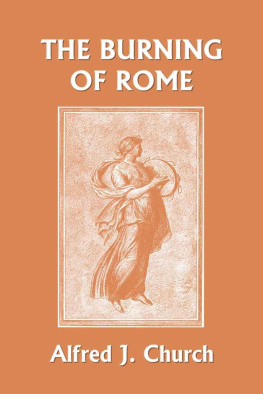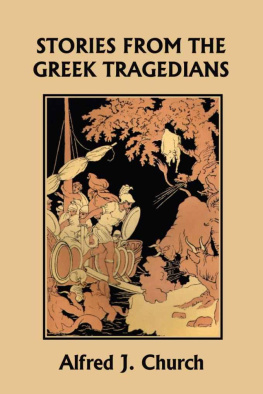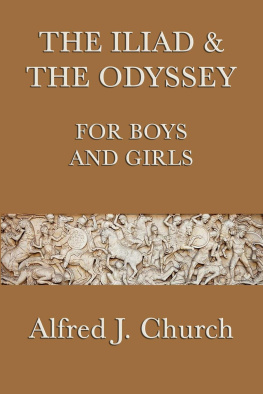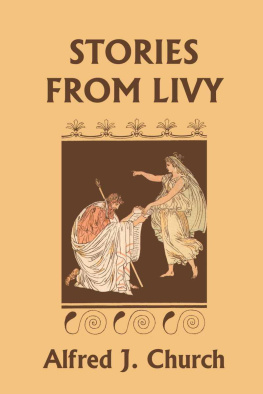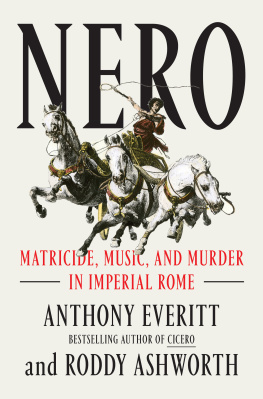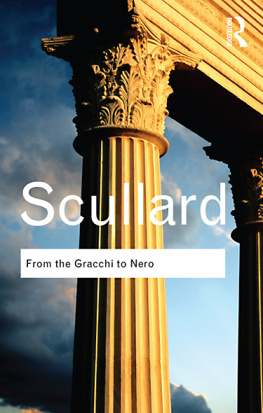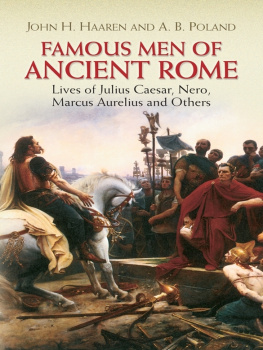Alfred J. Church - The Burning of Rome
Here you can read online Alfred J. Church - The Burning of Rome full text of the book (entire story) in english for free. Download pdf and epub, get meaning, cover and reviews about this ebook. year: 2009, publisher: Yesterdays Classics, genre: Art. Description of the work, (preface) as well as reviews are available. Best literature library LitArk.com created for fans of good reading and offers a wide selection of genres:
Romance novel
Science fiction
Adventure
Detective
Science
History
Home and family
Prose
Art
Politics
Computer
Non-fiction
Religion
Business
Children
Humor
Choose a favorite category and find really read worthwhile books. Enjoy immersion in the world of imagination, feel the emotions of the characters or learn something new for yourself, make an fascinating discovery.
- Book:The Burning of Rome
- Author:
- Publisher:Yesterdays Classics
- Genre:
- Year:2009
- Rating:5 / 5
- Favourites:Add to favourites
- Your mark:
- 100
- 1
- 2
- 3
- 4
- 5
The Burning of Rome: summary, description and annotation
We offer to read an annotation, description, summary or preface (depends on what the author of the book "The Burning of Rome" wrote himself). If you haven't found the necessary information about the book — write in the comments, we will try to find it.
The Burning of Rome — read online for free the complete book (whole text) full work
Below is the text of the book, divided by pages. System saving the place of the last page read, allows you to conveniently read the book "The Burning of Rome" online for free, without having to search again every time where you left off. Put a bookmark, and you can go to the page where you finished reading at any time.
Font size:
Interval:
Bookmark:
All rights reserved. No part of this book may be reproduced or retransmitted in any form or by any means without the written permission of the publisher.
This edition, first published in 2010 by Yesterday's Classics, an imprint of Yesterday's Classics, LLC, is an unabridged republication of the work originally published by Seeley, Service & Company, Limited in 1912. This title is available in a print edition (ISBN 978-1-59915-072-7).
Yesterday's Classics republishes classic books for children from the golden age of children's literature, the era from 1880 to 1920. Many of our titles are offered in high-quality paperback editions, with text cast in modern easy-to-read type for today's readers. The illustrations from the original volumes are included except in those few cases where the quality of the original images is too low to make their reproduction feasible. Unless specified otherwise, color illustrations in the original volumes are rendered in black and white in our print editions.
The Claudia of this story may be identified with the British princess whose marriage to a certain Pudens is celebrated by Martial in a pleasant little epigram, and, possibly, with the Claudia whose name occurs among the greetings of St Paul's Second Epistle to Timothy. It would have been interesting to identify her husband with the Pudens whose name stands so near hers in the Epistle, but the difficulties of doing so seem insuperable.
T HE reigning successor of the great Augustus, the master of some forty legions, the ruler of the Roman world, was in council. But his council was unlike as possible to the assembly which one might have thought he would have gathered together to deliberate on matters that concerned the happiness, it might almost be said, of mankind. Here were no veteran generals who had guarded the frontiers of the Empire, and seen the barbarians of the East and of the West recoil before the victorious eagles of Rome; no Governor of provinces, skilled in the arts of peace; no financiers, practised in increasing the amount of the revenue without aggravating the burdens that the tax-payers consciously felt; no philosophers to contribute their theoretical wisdom; no men of business to give their master the benefit of their practical advice. Nero had such men at his call, but he preferred, and not perhaps without reason, to confide his schemes to very different advisers. There were three persons in the Imperial Chamber; or four, if we are to reckon the page, a lad of singular beauty of form and feature, but a deaf mute, who stood by the Emperor's couch, clad in a gold-edged scarlet tunic, and holding an ivory-handled fan of peacock's feathers, which he waved with a gentle motion.
Let me begin my description of the Imperial Cabinet, for such it really was, with a portrait of Nero himself.
The Emperor showed to considerable advantage in the position which he happened to be occupying at the time. The chief defects of his figure, the corpulence which his excessive indulgence in the pleasures of the table had already, in spite of his youth, increased to serious proportions, and the unsightly thinness of his lower limbs, were not brought into prominence. His face, as far as beauty was concerned, was not unworthy of an Emperor, but as the biographer of the Csars says, it was "handsome rather than attractive." The features were regular and even beautiful in their outlines, but they wanted, as indeed it could not be but that they should want, the grace and charm in which the beauty of the man's nature shines forth. The complexion, originally fair, was flushed with intemperance. There were signs here and there of what would soon become disfiguring blotches. The large eyes that in childhood and boyhood had been singularly clear and limpid were now somewhat dull and dim. The hair was of the yellow hue that was particularly pleasing to an Italian eye, accustomed, for the most part, to black and the darker shades of brown. Nero was particularly proud of its color, so much so indeed, that, greatly to the disgust of more old-fashioned Romans, he wore it in braids. On the whole his appearance, though not without a certain comeliness and even dignity, was forbidding and sinister. No one that saw him could give him credit for any kindness of heart or even good nature. His cheeks were heavy, his chin square, his lips curiously thin. Not less repulsive was the short bull neck. At the moment of which I am writing his face wore as pleasing an expression as it was capable of assuming. He was in high spirits and full of a pleased excitement. We shall soon see the cause that had so exhilarated him.
Next to the Emperor, by right of precedence, must naturally come the Empress, for it was to this rank that the adventuress Poppa had now succeeded in raising herself. Her first husband had been one of the two commanders of the Prtorian Guard; her second, Consul and afterwards Governor of a great province, destined indeed himself to occupy for a few months the Imperial throne; her third was the heir of Augustus and Tiberius, the last of the Julian Csars. Older than the Emperor, for she had borne a child to her first husband more than twelve years before, she still preserved the freshness of early youth. Something of this, perhaps, was due to the extreme care which she devoted to her appearance, but more to the expression of innocence and modesty which some strange freak of naturefor never surely did a woman's look more utterly belie her dispositionhad given to her countenance. To look at her certainly at that moment, with her golden hair falling in artless ringlets over a forehead smooth as a child's, her delicately arched lips, parted in a smile that just showed a glimpse of pearly teeth, her cheeks just tinged with a faint wild-rose blush, her large, limpid eyes, with just a touch of wonder in their depths, eyes that did not seem to harbour an evil thought, any one might have thought her as good as she was beautiful. Yet she was profligate, unscrupulous, and cruel. Her vices had always been calculating, and when a career had been opened to her ambition she let nothing stand in her way. Nero's mother had perished because she barred the adventuress' road to a throne, and Nero's wife soon shared the fate of his mother.
The third member of the Council was, if it is possible to imagine it, worse than the other two. Nero began his reign amidst the high hopes of his subjects, and for a few weeks, at least, did not disappoint them, and Josephus speaks of Poppa as a "pious" woman; but we hear nothing about Tigellinus that is not absolutely vile. Born in poverty and obscurity, he had made his way to the bad eminence in which we find him by the worst of arts. A man of mature age, for by this time he must have numbered at least fifty years, he used his greater experience to make the young Emperor even worse than his natural tendencies, and all the evil influences of despotic power, would have made him. And he was what Nero, to do him justice, never was, fiercely resentful of sarcasm and ridicule. Nero suffered the most savage lampoons on his character to be published with impunity, but no one satirized Tigellinus without suffering for his audacity.
The scene of the Council was a pleasant room in the Emperor's seaside villa at Antium. This villa was a favourite residence with him. He had himself been born in it. Here he had welcomed with delight, extravagant, indeed, but yet not wholly beyond our sympathies, the birth of the daughter whom Poppa had borne to him in the preceding year; here he had mourned, extravagantly again, but not without some real feeling, for the little one's death. It was at Antium, far from the wild excitement of Rome, that he had what may be called the lucid intervals in his career of frantic crime.
Font size:
Interval:
Bookmark:
Similar books «The Burning of Rome»
Look at similar books to The Burning of Rome. We have selected literature similar in name and meaning in the hope of providing readers with more options to find new, interesting, not yet read works.
Discussion, reviews of the book The Burning of Rome and just readers' own opinions. Leave your comments, write what you think about the work, its meaning or the main characters. Specify what exactly you liked and what you didn't like, and why you think so.

